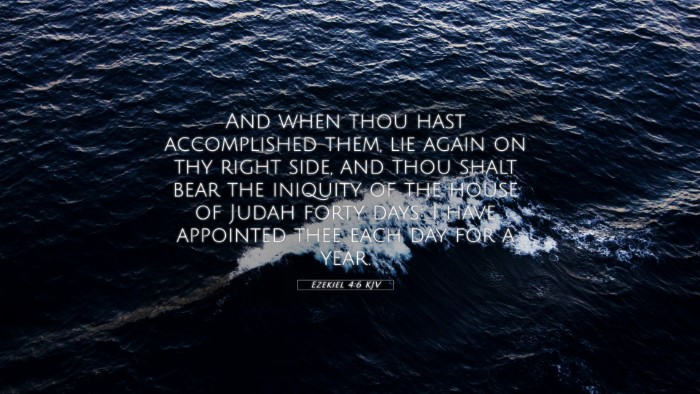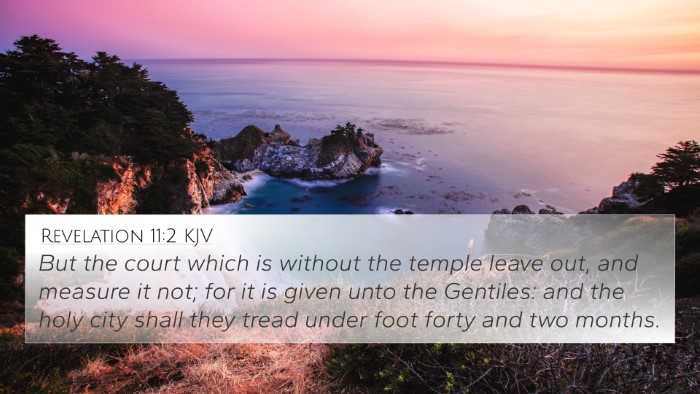Ezekiel 4:6 - Understanding the Verse
Bible Verse: Ezekiel 4:6
Verse Text: "And when thou hast accomplished them, lie again on thy right side, and thou shalt bear the iniquity of the house of Judah forty days: I have appointed thee each day for a year."
Summary of Insights
This verse is part of a symbolic act commanded by God to the prophet Ezekiel, meant to signify the impending judgment upon Judah. In this act, Ezekiel is instructed to lie on one side for a certain number of days, each day representing a year of Israel's sin. The prophetic nature of this action is both literal and metaphorical, reflecting not only the sins of Judah but also God's patience and justice.
Interpretive Insights from Commentaries
Matthew Henry's Commentary: Henry emphasizes the significance of the symbolic nature of Ezekiel's actions. The duration of lying on one side (390 days for Israel and 40 days for Judah) represents the years of iniquity that the nations have accrued. This illustrates God’s method of calculation concerning sin, urging the readers to understand the long-standing impact of unrepentant sin.
Albert Barnes' Notes: Barnes points out that God’s instructions to Ezekiel were not merely a display of prophetic drama but carried a serious warning. Each day represented a period of years, directly correlating the judgment with the length of sinfulness. He also notes the corrective purpose behind this enacted prophecy, emphasizing the need for repentance and the acknowledgment of sin before God.
Adam Clarke's Commentary: Clarke elaborates on the concept of collective punishment and individual accountability. The actions of the leaders and people of Judah have consequences that affect their entire community. His analysis brings forth the theological implications of the verse, showing how God’s judgment is meticulously calculated and dispensed, reflecting His holiness and justice.
Cross-References to Ezekiel 4:6
- Ezekiel 3:17-19: God appoints watchmen to warn people of impending judgment.
- Numbers 14:34: Each day represents a year as a consequence of sin.
- Lamentations 5:7: The iniquity of parents visited upon their children, highlighting generational sin.
- Isaiah 30:20: The need for correction through hardship.
- Jeremiah 25:11-12: The span of desolation for Judah due to disobedience.
- Daniel 9:24: Acknowledging sins and their consequences for the nation.
- Revelation 11:2: Measuring the temple and its significance as a representation of God's dwelling among His people.
- Matthew 23:37-39: A reflection on Jerusalem’s history of rebellion against divine instruction.
- Luke 13:1-5: Calls for repentance, emphasizing personal accountability for sin.
- Romans 2:5-6: The Day of Judgment resulting in each receiving according to their deeds.
Thematic Connections
This verse enriches the narrative concerning the themes of judgment, repentance, and prophetic witness throughout the Scriptures. The connection between the Old Testament and the New Testament is evident as the overarching theme of sin and redemption is explored.
Links to Other Themes:
- The role of prophets as instruments of Israel's conscience.
- God’s patient justice versus immediate reprisal.
- Covenantal relationships and their consequences in Biblical history.
- Representation of sin and accountability through prophetic action.
- The interplay between God's mercy and His righteousness.
Conclusion
Ezekiel 4:6 serves as a poignant reminder of the weight of sin and the importance of recognizing the long-term consequences of our actions before God. It invites readers not only to reflect on the specific historical context of Judah but also to apply the themes of accountability, repentance, and divine justice to their own lives. Studying this verse through cross-references enriches one’s understanding and deepens one’s spiritual reflections.
Further Study
For those looking to delve deeper into themes surrounding Ezekiel 4:6, consider exploring:
- Tools for Bible cross-referencing to unpack relational scripture.
- Methods for conducting comparative Biblical analysis.
- Utilizing Bible concordance for thematic studies.
- Engaging in cross-reference Bible study methods.
- Finding cross-references that support personal spiritual growth.









